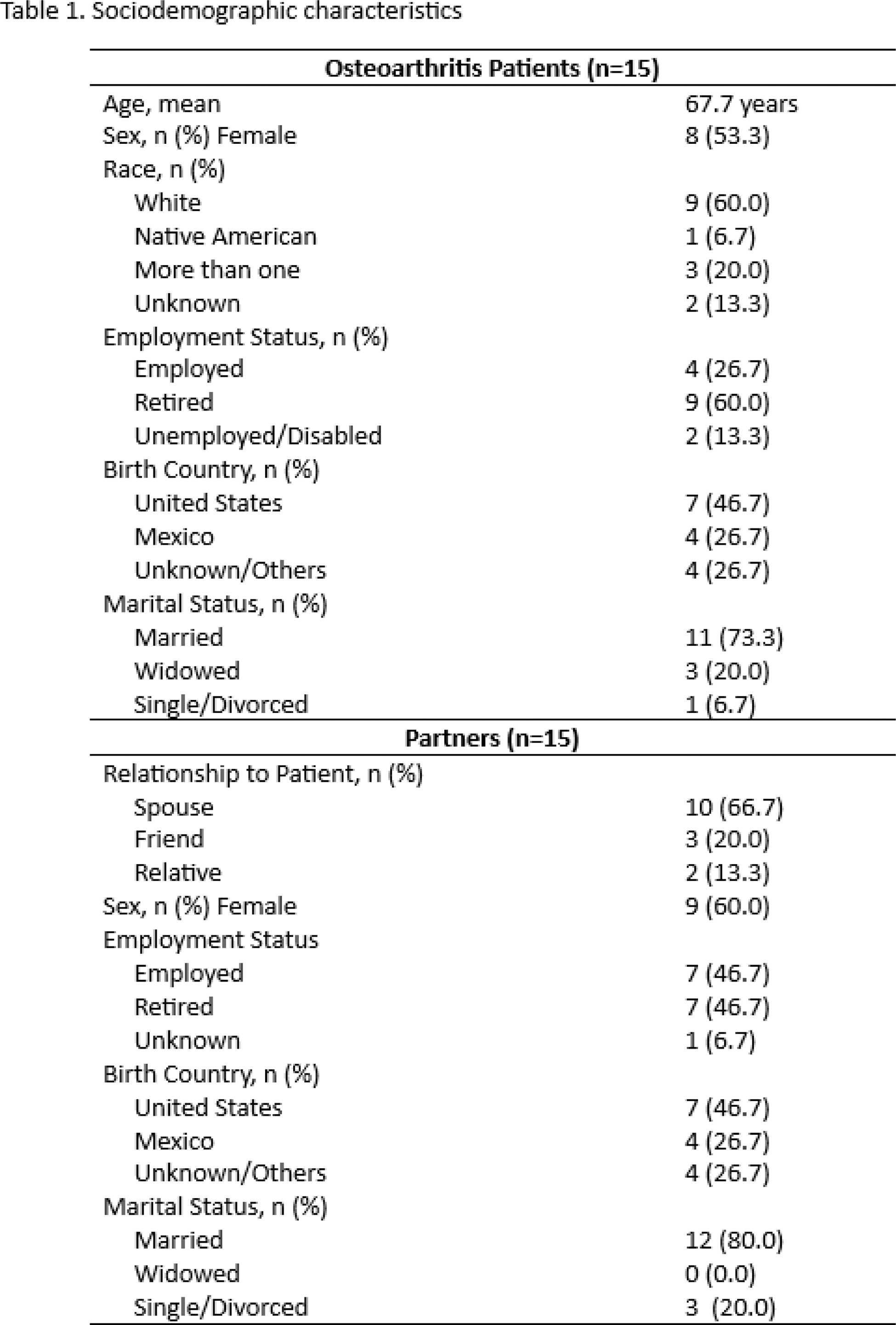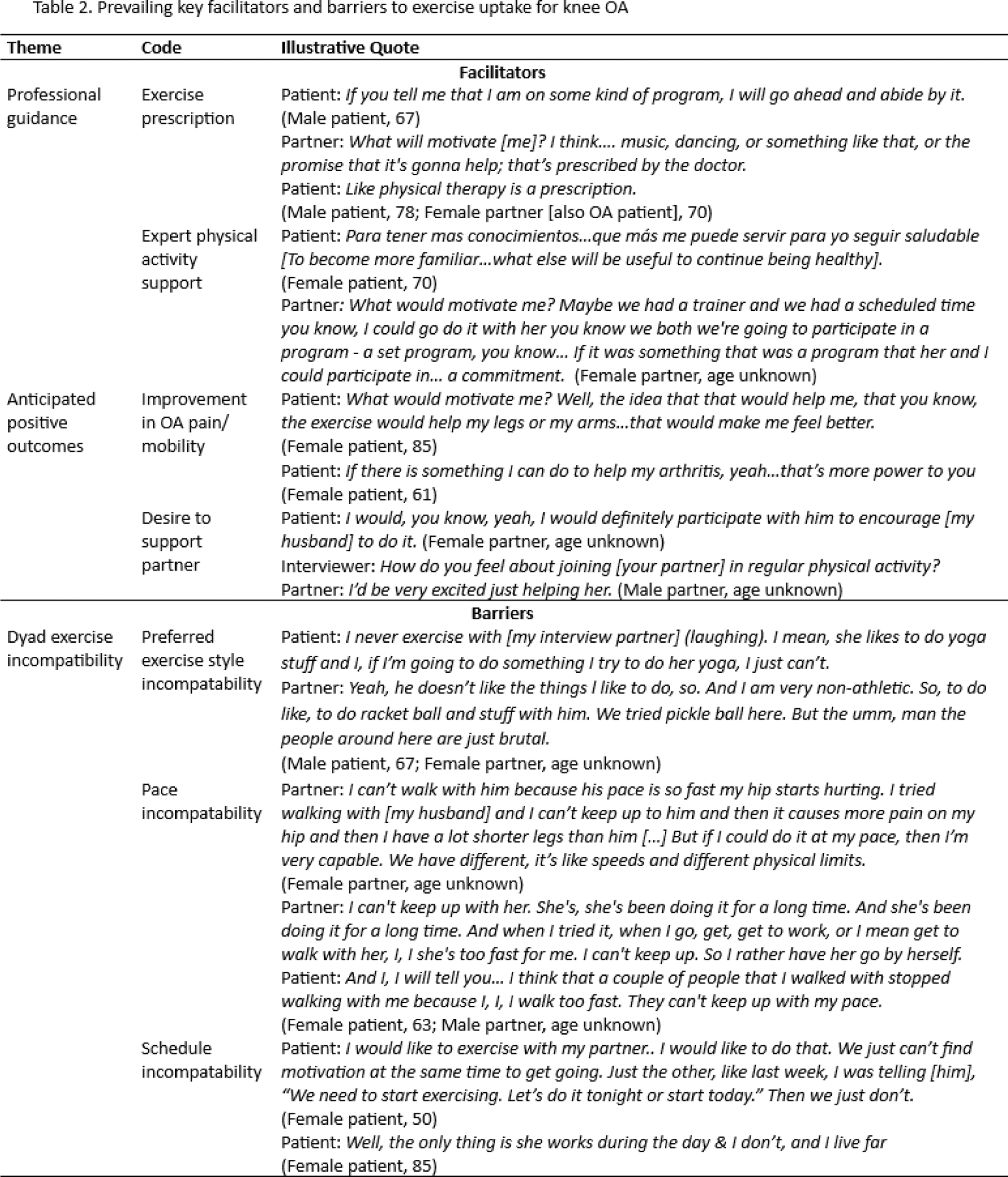

Background: Considering the large and growing number of Hispanics living in the United States (US) and the known negative impact of osteoarthritis (OA), it is crucial to elicit the perspectives of Hispanic patients with OA. Patients’ beliefs and attitudes about the disease may influence their utilization of exercise interventions.
Objectives: The objective of this study was to inform the design of a telehealth intervention to promote exercise and other physical activity (PA) program with a family member or close friend among Hispanics with OA.
Methods: Hispanic participants with chronic, frequent pain due to knee OA were recruited from a university medical center and the local community (Tucson, Arizona, US). All were asked to identify an adult member to join them in a semi-structured interview conducted in English or Spanish via Zoom. Each dyad was interviewed using open-ended questions based on the Theoretical Domains Framework of behavior change and asked to discuss beliefs about exercise for OA as well as barriers and facilitators to participating in an exercise or other PA program for OA. Interviews were transcribed and content analysis performed in MAXQDA 2024.
Results: Interviews were conducted with 8 female and 7 male patients (mean age: 67.7) and their chosen partners (10 spouses, 3 friends, 2 relatives; Table 1). All participants identified one or more key facilitators of and barriers to participation in a dyadic PA intervention for knee OA (Table 2). The most prevalent key facilitator was availability of professional guidance – both for initiation of an exercise or PA program for knee OA and for its conduct. Patients identified a healthcare provider’s instruction (i.e., formal prescription) to take up PA and the provision of expert instruction (e.g., via a physical therapist or personal trainer) as key facilitators. Participants offered a number of rationales for why receiving guidance would be a key factor. The most frequent of these was that expert guidance would ensure safety (e.g., mitigating OA aggravation) while optimizing the effects of the intervention. Another significant facilitator in the uptake and adherence to a PA program was anticipated positive outcomes, including improvement of OA-related pain and increased mobility. Barriers to exercise or PA program uptake and adherence such as access to safe and sufficient space were not encountered in this study. There was limited concerns about telehealth navigation for most. Several expressed lack of concordance with partner schedule and incompatible exercise pace/style as potential barriers (Table 2). While many patients and their interview partners disclosed physical or mental comorbidities, few individuals felt that those comorbidities might prevent them from engaging in regular PA. Conversely, many suggested that exercise would be useful for their overall wellbeing.
Conclusion: Our results suggest that – among a sample of Hispanic older adults in the urban southwest in the US – an exercise or other PA intervention for knee OA would be well-received when prescribed by a referring healthcare provider and guided by a physical therapist or trainer. Barriers to intervention participation were limited but included discordance with partner schedule and exercise pace.


REFERENCES: NIL.
Acknowledgements: NIL.
Disclosure of Interests: Ernest Vina: None declared, Leah Stauber: None declared, Carolina Villamil-Grest: None declared, Reynaldo Gomez: None declared, Amanda Hurtig: None declared, Faryal Razzaq: None declared, Jazmin Dagnino: None declared, Kim Bennell: None declared, C. Kent Kwoh Focus Medical Communications, Trial Spark, Express Scripts, GSK, TLC Biosciences, AposHealth, Abbvie, Artiva, Lilly, BMS, Cumberland, Pfizer, GSK, Galapagos.
© The Authors 2025. This abstract is an open access article published in Annals of Rheumatic Diseases under the CC BY-NC-ND license (